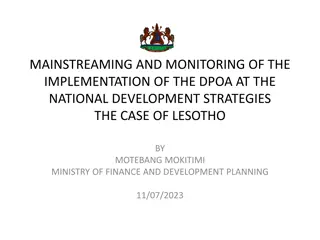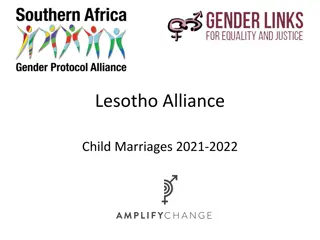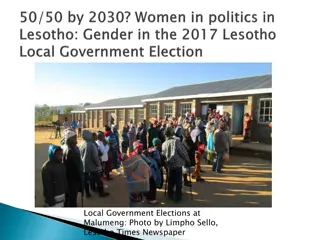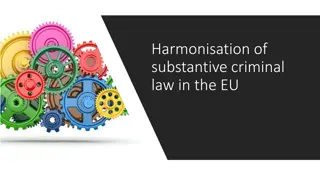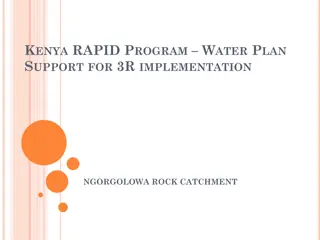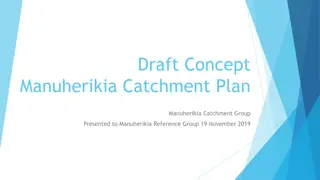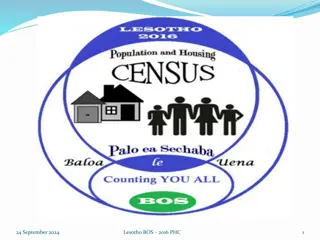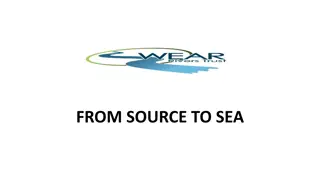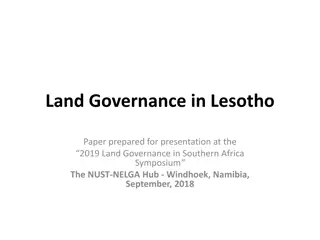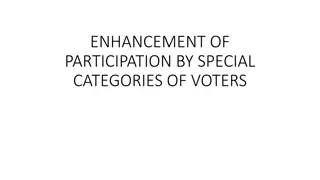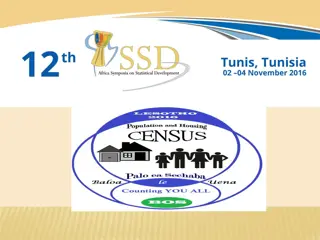Enhancing Policy Harmonisation for Integrated Catchment Management (ICM) in Lesotho
Prioritizing policy harmonisation for ICM in Lesotho is crucial for sustainable water resource management. Key actions include revising the Water Act of 2008, aligning sectoral legislation, establishing clear links between land and water use, and supporting decentralisation efforts for operationalising ICM at the local level. Additionally, incorporating climate change adaptation elements, such as reflecting climate and disaster risks in planning processes, valuing ecosystem services, and mainstreaming resilience considerations, is essential for enhancing ICM effectiveness.
- Policy harmonisation
- Integrated Catchment Management
- Lesotho
- Water resource management
- Climate change adaptation
Download Presentation

Please find below an Image/Link to download the presentation.
The content on the website is provided AS IS for your information and personal use only. It may not be sold, licensed, or shared on other websites without obtaining consent from the author. Download presentation by click this link. If you encounter any issues during the download, it is possible that the publisher has removed the file from their server.
E N D
Presentation Transcript
Date: 08.03.2022 Presentation to: NTS members, Directors, DPs other key ICM stakeholders Content: Priorities for policy harmonisation in support of ICM Based on external review of Lesotho s legal and policy framework for ICM (Aug 2020 Nov 2021)
ICM legislative basis & policy harmonisation A revision of 2008 Water Act to codify the definition and institutional arrangements for catchment management is a key aspect of ICM policy harmonisation. Such a revision should be based on the provisions in the 2014 Long Term Water and Sanitation Strategy and subsequent analysis. An alignment of related sectoral legislation for ICM, in particular the 2008 Environment Act, Range Management Bill to ensure consistency in regulations, mandates and planning approaches. Harmonise to establish a clear link between Land and Water uses through reform of relevant land legislation i.e 2010 Land Act or the Town & Country planning Act and spatial development Enactment of policies, regulations and strategies to operationalise ICM according to set roles and mandates. This might include an update to the LTWSS or development of a new ICM-specific policy Support to development of subsidiary legislation regulation and guidelines to key ministries (i.e Range Management Bill) .
ICM policy support to operationalisation at the local level Support decentralisation efforts (MoLGC) through bylaw drafting to regulate land and water use, development and institutionalisation of a guideline Legal review of Water Act (section 42 provide clarity on role and responsibilities of local government in ICM implementation Strengthen capacity of local governments for financial implementation of ICM plans Support harmonisation of function between Local councils and Chief through training
ICM policy support to Climate Change Adaptation A revision of the 2008 Water Act would further allow for the inclusion of progressive elements for water resource management in line with ReNOKA principles, such as a systematic reflection of climate and disaster risk in catchment planning processes, the role of ecosystem services for IWRM / ICM, a systematic valuation of ecosystem services and resilient livelihoods in Lesotho s catchments Mainstreaming of progressive elements on climate and disaster risk in all legal instrument supported or through consultation Identification of revenue generation potential of payment for ecosystem services and carbon storage including institutional/legal anchor Climate Change Risk Assessment embedded in planning Mainstreaming of climate change consideration in the design of financing architecture (conditionality) Supporting pilot of Public Infrastructure Engineering Vulnerability Committee (PIEVC) protocols under GIDRM initiative
ICM policy support to Gender and Human Right Mainstreaming Profiling and the development of guidelines for gender sensitive measures Mainstreaming of Gender and Human rights consideration in Water Act revision- in cooperation with relevant ministry and NGOs Mainstreaming of Gender and Human rights consideration in all supported legislative act Mainstreaming of gender consideration in the design of financing architecture (conditionality)
Support to sustainable financing for ICM Commissioning of feasibility study on financing architecture: including revision of legal anchoring and institutional set up Piloting of Performance Based Grants for Community Councils based on ICM planning Piloting of Grants for community to encourage sustainable livelihood approaches
Priorities and next steps Defined priorities and ongoing work: Initiate Water Act 2008 riview in cooperation with all key stakeholders Initiate support to by-law drafting Initiate Financing Mechanism Feasability study Refinement of priorities within 1st and 2nd quarter: Consultation on prioritisation for further harmonisation and drafting of secondary legislation through Stakeholder consultation: Department of Range Department of Soil and Water Conservation Department of Forestry Department of Decentralisation Department of Chieftanship Commissioner of Land Department of Water Department Rural Water Supply Commissioner of Water Department of Irrigation Addressing the elephant in the room: ICM institutional form i.e indipendent institution
Comments & questions Thank you for your attention
Thank Thank you you
















